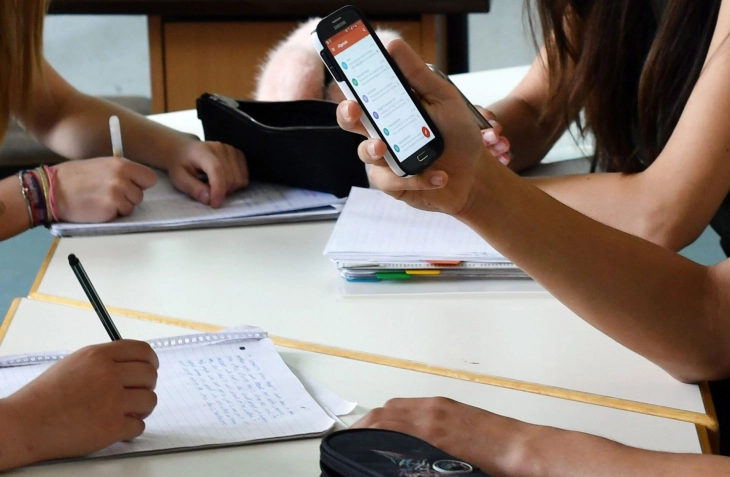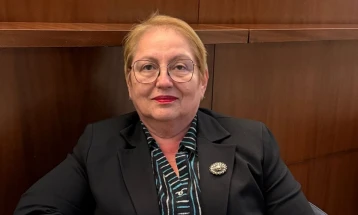European schools crack down on mobile phone use over health concerns
- As digital technology becomes an ever-present force in young people’s lives, European countries are increasingly raising concerns about the excessive use of mobile phones, social media and other forms of digital communication – with some moving towards banning or restricting mobile phones in schools.

enr - Brussels
15 September 2024
As digital technology becomes an ever-present force in young people’s lives, European countries are increasingly raising concerns about the excessive use of mobile phones, social media and other forms of digital communication – with some moving towards banning or restricting mobile phones in schools.
Recent studies have highlighted alarming links between excessive screen time and the consequent negative impact on the mental health and academic performance of children and young people. For example, a study by the Organisation for Economic Co-operation and Development (OECD) advised limited and responsible use of mobile phones in schools.
In July, upon her re-election as European Commission President for a second term, Ursula von der Leyen vowed to tackle social media addiction and cyberbullying, referring to widespread concerns about the negative impact on mental health and well-being.
“We see more and more reporting on what some call a mental health crisis,” von der Leyen said. “We will convene the first-ever European-wide enquiry on the impact of social media on the wellbeing of young people. We owe it to them,” she added.
On cyberbullying, von der Leyen said: “My heart bleeds when I read about young people harming themselves or even taking their lives because of online abuse.” She vowed to “tackle the plague of cyberbullying” and to “take action against the addictive design of some platforms”.
Keeping mobile devices out of sight
While the European Union has been increasingly aware of the negative effects of social media and mobile phone use among young people, there are no EU-wide rules to tackle these issues across all of the bloc’s 27 member states. Instead, rules vary by country.
Some European countries are considering or have already introduced bans on mobile phones in schools or restrictions on their use during school hours. These include Belgium, France, the Netherlands, Italy, Spain and Greece.
Other countries, such as Slovenia, Croatia and EU membership candidate Bosnia and Herzegovina are exploring options to address the concerns, but have not yet introduced nationwide bans. Instead, schools are taking matters into their own hands.
The Netherlands: Schools in the Netherlands enacted a complete nationwide ban on mobile phones as of the first week of September. Phones in secondary school classrooms have been forbidden since the beginning of the year, a measure that has now been extended to primary schools from the start of the new school year.
Phones may still be used in class if they are necessary for the content of the lesson, for example when learning about media skills, or if pupils are dependent on them for medical reasons or due to a disability.
France: At 180 “colleges”, the middle schools French children attend between the ages of eleven and 15, a scheme is being trialled to ban the use of mobile phones during the entire school day. The trial of the so-called “digital pause”, which encompasses more than 50,000 pupils, is being implemented ahead of a possible plan to enforce it nationwide from 2025.
Right now, pupils in French middle schools must turn off their phones. The experiment takes things further, requiring children to hand in their phones on arrival. It is part of a move by President Emmanuel Macron for children to spend less time in front of screens, which the government fears is arresting their development.
A report on young people’s use of screens presented to Macron in April by a commission of experts recommended no phones until the age of 11, giving children between 11 and 13 years old a so-called “dumb phone” without internet and restricting internet access until the age of 15. Such a “dumbphone” device, called “The Phone” is now being developed in France by an entrepreneur mother, her son and a partner.
Belgium: In Belgium, mobile phones will be banned in classrooms of hundreds of French-speaking schools in Brussels and Wallonia starting this school year. The plans were announced by the francophone region’s new government over the summer.
In the Dutch-speaking region of Flanders, however, there is no general ban on phones in schools, but some have decided to introduce prohibitions on their own.
Greece: In Greece, students are required to keep their mobile phones in their school bags at all times during lessons. The Minister of Education, Kyriakos Pierrakakis, clarified that clearly visible possession and use of mobile phones is prohibited even during breaks and a violation would lead to a one-day suspension.
Last week, Prime Minister Kyriakos Mitsotakis did not rule out the possibility that students would be forced to lock their mobile phones away and collect them after school hours.
Italy: In Italy, mobile phones are banned from classrooms starting this school year, under a decree issued by Prime Minister Giorgia Meloni’s right-wing administration in July. The measure was introduced by Education Minister Giuseppe Valditara from the nationalist League party and aims to prohibit the use of mobile phones in schools, including for teaching purposes. Tablets and computers can still be used with teachers’ consent.
Spain: In several regions in Spain, bans and restrictions on mobile phones in school have already been in place, such as the Communities of Madrid, Galicia, Castilla-La Mancha, Andalusia and Extremadura.
In January, the State School Council of Spain – the highest consultative body of the government in the educational field – unanimously approved a veto on the use of mobile phones in primary education and limitations for secondary education.
Consequently, other regions began to implement measures. In Aragon, the Valencian Community, the Balearic Islands and Navarre as well as Andalusia, for example, teachers have the power to confiscate and turn off students’ phones until the end of the school day.
Sweden: Sweden’s Public Health Agency (FHM) has recently issued recommendations on screen time for children. It said children under the age of two should be kept away from digital media and television completely and it should be limited for more senior ages.
The new recommendations are based on research and how much time the kids should spend on different things to feel well. According to Swedish government figures, teenagers between 13 and 16 in Sweden in general spend 6.5 hours a day online. Sweden’s Minister of Social Affairs and Public Health, Jakob Forssmed, hopes that the tech companies will act in order to reduce the risk for kids to get stuck online.
Slovenia: In Slovenian primary and secondary schools, it is up to each individual school to restrict the use of mobile devices. Internal rules vary from school to school, but few have banned the use of mobile devices completely. According to experts, a first step towards reducing screen use would be to set national guidelines.
Online violence among young people is on the rise, according to this year’s survey by Safe.si, the national awareness-raising point for safe internet use. In Slovenia, as many as 65 percent of primary school girls and 55 percent of primary school boys have experienced some form of online violence. In secondary school, 63 percent of female students and 54 percent of male students have experienced some form of online violence.
Croatia: In Croatia, there are no uniform rules and the Ministry of Education has not yet made any decision on this matter. However, some schools have already made a decision to prohibit the use of mobile phones by students the entire time they are at school, including during breaks between individual lessons.
These include schools in several Croatian cities: Zagreb, Split, Rijeka, Osijek, Zadar. One school in Split also introduced a ban on bringing mobile phones to school, claiming that a simple ban of using it is not enough.
Bosnia and Herzegovina: To encourage greater socialisation among students and prevent juvenile delinquency, several schools in Bosnia and Herzegovina have banned bringing mobile phones to class. However, despite a parliamentary initiative to extend this practice, it has not yet been implemented in most educational institutions across the country.
According to a study by UNICEF and the Communications Regulatory Agency of Bosnia and Herzegovina, every second child in Bosnia and Herzegovina under the age of eleven has a profile on a social media platform. More than 50 percent of children have experienced unpleasantness online, yet over 85 percent have not discussed it with anyone.
Photo: enr/dpa







